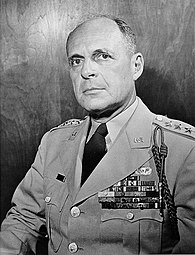Matthew Ridgway
| Matthew Ridgway | |
|---|---|
 |
|
| Birth name | Matthew Bunker Ridgway |
| Nickname(s) | "Matt" |
| Born | March 3, 1895 Fort Monroe, Virginia, United States |
| Died | July 26, 1993 (aged 98) Fox Chapel, Pennsylvania, United States |
| Buried at |
Arlington National Cemetery, Virginia, United States Section 7, Grave 8196-1 (38°52′37″N 77°04′14″W / 38.87702°N 77.07047°W) |
| Allegiance |
|
| Service/branch |
|
| Years of service | 1917–1955 |
| Rank |
|
| Unit |
|
| Commands held |
15th Infantry Regiment 82nd Infantry Division 82nd Airborne Division XVIII Airborne Corps Eighth Army Supreme U.N. and U.S. Commander in Korea Chief of Staff of the United States Army |
| Battles/wars | |
| Awards |
Distinguished Service Cross (2) Army Distinguished Service Medal (4) Silver Star (2) Legion of Merit (2) Bronze Star w/ Valor Device Purple Heart Presidential Medal of Freedom Congressional Gold Medal |
Mexican Border Service
World War I
Banana Wars
General Matthew Bunker Ridgway (March 3, 1895 – July 26, 1993) was a senior United States Army officer. He served with great distinction during World War II, where he was the Commanding General (CG) of the 82nd Airborne Division, leading it in action in Sicily, Italy and Normandy, before taking command of the newly formed XVIII Airborne Corps in August 1944, holding this post until the end of the war, commanding it in the Battle of the Bulge, Operation Varsity and the Western Allied invasion of Germany.
He held several major commands after the war and was most famous for resurrecting the United Nations (UN) war effort during the Korean War. Several historians have credited Ridgway for turning the war around in favor of the UN side. His long and prestigious military career was recognized by the award of the Presidential Medal of Freedom on May 12, 1986 by President Ronald Reagan, who stated that "Heroes come when they're needed; great men step forward when courage seems in short supply."
...
Wikipedia
